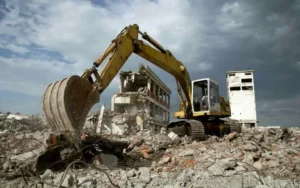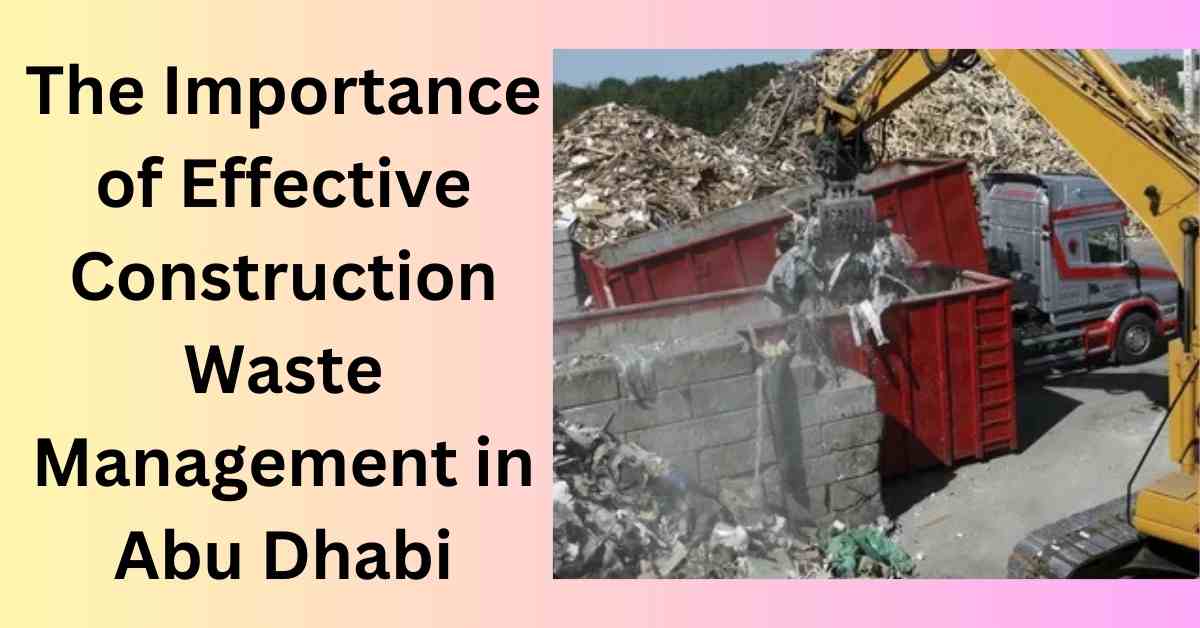Abu Dhabi is a thriving city with a rapidly growing skyline, ambitious construction projects, and a vision for sustainability. The construction industry plays a significant role in shaping the city’s infrastructure and economic development. However, with the industry’s growth comes a major challenge—managing construction waste. Effective construction waste management is essential for reducing environmental impact, maintaining cleanliness, and promoting sustainable practices in Abu Dhabi.
This blog explores why construction waste management is important, the challenges it addresses, and the solutions that can contribute to a cleaner and greener future.
NOTE : Are you ready to make a positive impact on the environment and your business? Partner with experts in construction waste management to ensure your projects are both efficient and sustainable. Let’s work together to build a cleaner, greener Abu Dhabi for future generations. Reach out today to explore effective waste management solutions that align with your project goals!

Understanding Construction Waste and Its Impact
Construction waste refers to the materials discarded during construction, demolition, or renovation projects. This waste includes concrete, wood, metals, bricks, plastics, glass, and other materials that may no longer be needed for the project. If not properly managed, this waste can have several negative impacts:
- Environmental Pollution: Construction waste can pollute the land, air, and water if not disposed of responsibly. For example, hazardous materials like chemicals and paints can contaminate soil and water sources.
- Health Hazards: Improper disposal of waste can create health risks for workers and nearby communities. Dust and debris from construction sites can cause respiratory problems and other health issues.
- Resource Waste: Many construction materials can be reused or recycled, but when they are discarded carelessly, valuable resources are wasted, increasing the demand for new raw materials.
- Landfill Overload: Construction waste adds to the burden on landfills, which are already limited in capacity, especially in urban areas like Abu Dhabi.
Why Construction Waste Management Matters
In a city like Abu Dhabi, where development projects are constantly underway, effective construction waste management is crucial. It benefits the environment, the economy, and the overall quality of life for residents.
Protecting the Environment
Proper construction waste management minimizes pollution and conserves natural resources. Recycling and reusing materials reduce the need for extracting raw materials, helping to preserve the environment for future generations.
Supporting Abu Dhabi’s Sustainability Goals
Abu Dhabi is committed to sustainability and environmental protection as part of its long-term vision. Effective construction waste management aligns with the city’s sustainability initiatives, such as reducing carbon emissions and promoting a circular economy.
Reducing Costs for Businesses
By recycling and reusing materials, construction companies can reduce costs associated with purchasing new materials and waste disposal. This cost-efficiency also makes projects more affordable for clients.
Enhancing Public Health and Safety
Managing construction waste properly ensures cleaner and safer environments for workers and communities near construction sites. It also reduces the risk of accidents caused by poorly managed debris.
Key Challenges in Construction Waste Management
Despite its importance, construction waste management comes with challenges that need to be addressed:
Lack of Awareness
Many construction companies and workers may not be fully aware of the benefits of waste management or the correct methods for disposing of waste.
Limited Recycling Facilities
The availability of recycling facilities for construction materials is still growing. Limited access can make it difficult for companies to recycle waste effectively.
High Costs of Waste Disposal
In some cases, the cost of proper waste disposal can be higher than simply discarding materials in landfills. This can discourage businesses from adopting sustainable practices.
Enforcement of Regulations
While Abu Dhabi has strict waste management regulations, enforcement can sometimes be inconsistent. Ensuring compliance across all projects remains a challenge.
Best Practices for Construction Waste Management
To overcome these challenges and ensure effective waste management, construction companies in Abu Dhabi can adopt the following best practices:
1. Waste Reduction at Source
The first step in managing waste is to reduce it at the source. By planning projects carefully and ordering materials in the right quantities, companies can minimize waste generation.
2. Recycling and Reusing Materials
Many construction materials, such as concrete, metals, and wood, can be recycled or reused. Establishing processes for sorting and collecting recyclable materials is key to reducing waste.
3. Proper Disposal of Hazardous Waste
Hazardous materials like chemicals, paints, and adhesives must be disposed of responsibly to avoid environmental and health risks. Specialized facilities can handle these materials safely.
4. Partnering with Waste Management Companies
Professional waste management companies have the expertise and resources to handle construction waste efficiently. Partnering with these companies ensures compliance with regulations and promotes sustainable practices.
5. Employee Training and Awareness
Educating workers about the importance of waste management and training them in proper disposal methods can significantly improve waste handling on construction sites.
6. Technology and Innovation
Using technology like smart waste management systems and innovative recycling techniques can make waste management more efficient and cost-effective.
The Role of Abu Dhabi’s Government and Regulations
The government of Abu Dhabi plays a crucial role in promoting construction waste management through regulations, incentives, and infrastructure development. Key initiatives include:
- Waste Management Policies: Abu Dhabi has implemented strict regulations to ensure proper handling and disposal of construction waste. These policies require companies to have waste management plans in place before starting projects.
- Tadweer (The Center of Waste Management): Tadweer oversees waste management in Abu Dhabi, providing services, facilities, and awareness programs to support sustainable waste handling.
- Recycling Programs: The government encourages recycling through incentives and partnerships with private companies to establish recycling facilities.
Benefits of Effective Construction Waste Management
When construction waste is managed effectively, it brings numerous benefits to Abu Dhabi:
Environmental Benefits
- Reduced pollution and greenhouse gas emissions.
- Conservation of natural resources through recycling and reuse.
Economic Benefits
- Cost savings for businesses by reusing materials.
- Job creation in the waste management and recycling industries.
Social Benefits
- Cleaner and safer communities.
- Enhanced quality of life for residents through sustainable urban development.
Contribution to Global Goals
By managing construction waste responsibly, Abu Dhabi contributes to global sustainability goals, such as reducing waste and promoting responsible consumption and production.
Conclusion: Building a Sustainable Future with Construction Waste Management
Construction waste management is more than just a necessity; it is a responsibility that every stakeholder in Abu Dhabi’s construction industry must embrace. By reducing waste, recycling materials, and adopting sustainable practices, the city can achieve its vision of becoming a global leader in urban development and environmental sustainability.
For more insightful articles related to this topic, feel free to visit netblogz
